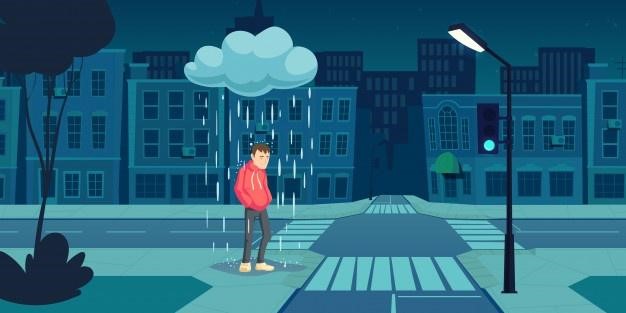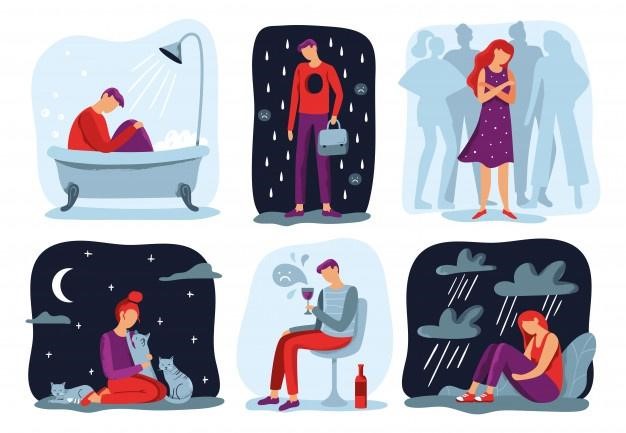Everything You Need To Know About Chronic Loneliness

List of Contents
Introduction to Chronic Loneliness

Loneliness can kill someone from inside. I know that’s a little bit harsh, but that’s the truth…no one can ignore it! Talking about chronic loneliness, chronic loneliness is the term used for describing a long period of loneliness. You might be thinking that they are the same words, but no! Chronic loneliness and loneliness are two different mental health conditions. They both affect your physical and mental health differently.
Loneliness is the term used for the occurrence of negative feelings when social connections are not fulfilled as per need. Little bit of alone time or me-time is good for mental health as it helps us to recharge and relax. However, everyone has a different personality and their demands of alone time and social connection are also different. That is why loneliness and chronic loneliness are not the same. Isolation and loneliness are two different roads that take a toll on emotional health and overall wellbeing. This blog covers everything you need to know about chronic loneliness.
Related Read: Books to help you combat loneliness
Causes of Chronic Loneliness

There are numerous reasons behind someone’s loneliness. Like:
- Constant change of schools, colleges, or jobs
- Moved to a new city
- Work from home
- End of a serious relationship
- Abandoned by friends
- Separated from family
- Living alone for the first time
Related Read: Alone time vs. Loneliness
Above examples are mostly the circumstances wherein we try to adjust ourselves so that loneliness can be removed. But, sometimes we are not able to cope with it and with time it becomes chronic. And surprisingly, we are not comfortable talking about our loneliness because we do not want to look weak in front of others (sadly, it’s a part of mental health stigma). Not talking about the loneliness and not reaching for support makes loneliness more severe.
Furthermore, the absence of social connections also contributes to chronic loneliness. Living far from your partner or a loved one can also contribute to chronic loneliness. Also, there are some other factors that result in chronic loneliness like having so many casual friends but not feeling close to anyone. Chronic loneliness can happen even when you are single.
Additionally, living with the chronic disorder also increases the risk of loneliness. Some of the physical and mental health disorders result in isolation which results in chronic loneliness.
Symptoms of Chronic Loneliness

Below-mentioned are some of the common signs and symptoms of chronic loneliness:
- Reduced energy
- Not able to concentrate
- Feeling foggy
- Reduced appetite
- Feelings of hopelessness, worthlessness, or self-doubt
- Decreased immunity
- Chronic pains and body aches
- Amplified interest in shopping
- Substance use or increased use of alcohol
- Increased social media use or binge-watching
- Cravings of cozy places or drinks
If not diagnosed or treated properly, chronic loneliness can lead to severe complication like:
1. Chronic illnesses
- High cholesterol
- Emotional stress
- Depression
- Diabetes
2. Sleep quality
- Oversleeping
- Less sleep
- Always tired or lethargic
Treatment of Chronic Loneliness

It might be really hard to detect or diagnose chronic loneliness on time; however, it is completely possible to treat it.
Regardless of the reason behind chronic loneliness, talking to a therapist or a counselor is the only way to make life and health better. If the reason behind your chronic illness is related to a chronic disorder, Calm Sage strongly recommends looking for a therapist before it gets severe.
Also, if you feel lonely without any reason, it may be high-time to see a therapist. To connect with a certified and experienced therapist from Betterhelp, click here.
Overcoming tips

1. Try to stay in touch with the loved ones or partners.
2. You can also participate or volunteer in community events.
3. Try out a new hobby. Read our related blogs on hobbies and creativity:
4. Get out of the home and meet with your friends.
5. Adopt a furry buddy.
6. Meet your family virtually via video call if living far from home.
7. Get comfortable with “me-time”.
8. Choose rewarding and fulfilling activities
9. Schedule some time for exercise or meditation.
10. Enjoy the sunlight or nature.
Related Read: 5 Simple Steps to deal with Loneliness
When to see a therapist

If the feeling of loneliness is lingering, it may be high time to reach a mental health professional. Consider getting help when:
- Negative thoughts are impacting your life
- Feeling depressed
- You have symptoms of other mental health issues
To connect with a mental health provider online from Betterhelp, click here.
Disclaimer: As BetterHelp Affiliate, We may receive compensation from BetterHelp or other sources if you purchase products or services through the links provided on this page.
I hope this information helps to understand chronic loneliness. I personally advise you to not ignore your loneliness, seek support before it becomes complex or severe. If you’re looking for help online, try Betterhelp today and avail the discounts.
Thanks for reading.




















